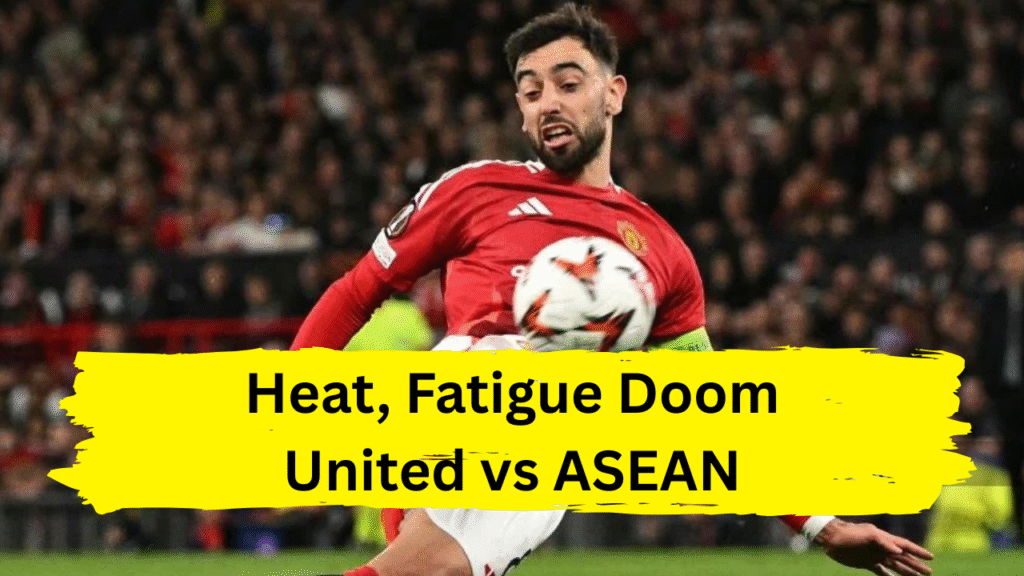The image was jarring: multi-millionaire global football stars, icons of the most commercially powerful league on earth, staggering under the oppressive Kuala Lumpur sky. Their shirts clung to them like lead weights, their movements grew labored, and their focus dissolved in the 31°C heat and suffocating humidity of the Bukit Jalil Stadium. This wasn’t a grueling Premier League title decider; it was a post-season friendly against the ASEAN All-Stars, a team of players assembled weeks prior from leagues across Southeast Asia. Yet, as the final whistle confirmed a humiliating 1-0 defeat, the question hung heavy in the humid air: Did Manchester United’s stars collapse due to the brutal environment, sheer exhaustion from a grueling campaign, or a deeper, more alarming fragility that has become the club’s hallmark? The truth, like the Malaysian weather, was a complex, uncomfortable blend of all three .
The Crucible of Kuala Lumpur: When Climate Became the Twelfth Man
From the first training session the day before the match, the Malaysian conditions were an undeniable adversary. Reports described players like Matthijs de Ligt and Joshua Zirkzee emerging from an early fitness drill “soaked in sweat,” struggling even during a basic warm-up under the “heavy, storm-threatening sky.” Standing still was “tiring enough,” a stark indicator of the physiological battle awaiting them . Matchday amplified this challenge exponentially. The Telegraph’s correspondent in the stadium noted the “31C heat and oppressive humidity” as defining factors, sapping energy reserves far quicker than any competitive fixture played in milder European climes . This wasn’t merely discomfort; it was a performance inhibitor. The body’s ability to maintain intensity, make split-second decisions, and execute precise technical actions diminishes rapidly under such thermal stress. For a team already running on empty, the environment became an accelerator of decline. The infamous “Mexican wave” rippling through the stands midway through the second half, a phenomenon Simon Stone of the BBC noted often emerges early in such “non-competitive out of season” games, was a stark visual metaphor for the contest’s lost competitive edge – a spectacle rather than a sporting contest, partly dictated by the energy-sapping climate .
A Season’s Weight: The Inescapable Shadow of Exhaustion
While the heat was punishing, it merely poured fuel on the smoldering embers of profound physical and mental fatigue. United arrived in Kuala Lumpur not on a triumphant victory lap, but on the heels of a “difficult and disappointing season,” as new CEO Omar Berrada had acknowledged just hours before kick-off . Their final Premier League match, a 2-0 win over Aston Villa, offered scant consolation for a campaign ending without Champions League qualification and punctuated by early cup exits and Europa League final heartbreak against Tottenham just a week prior. The emotional and physical toll was immense. This ASEAN friendly wasn’t a fresh start; it felt like a cruel extension of a marathon already run. Ruben Amorim’s solution – deploying a staggering 27 players over the 90 minutes – was less a tactical masterstroke and more a desperate scramble to manage depleted batteries . Quadruple substitutions after just thirty minutes, followed by eleven changes at half-time, shattered any semblance of rhythm or cohesion. Players like Casemiro, who looked “finished” according to some fan reactions, and Harry Maguire, appearing “ponderous,” embodied this collective weariness . The constant chopping and changing, while understandable from a workload perspective, resulted in what The Telegraph damningly described as Amorim using “27 players over 90 minutes without finding a blend.” The team became a revolving door of individuals operating at half-speed, incapable of mounting sustained pressure or displaying the defensive concentration needed to track Maung Maung Lwin’s decisive run .
Beyond the Heat and Tired Legs: The Unmistakable Stench of Fragility
Yet, attributing this humiliation solely to weather and weariness would be a dangerous oversimplification. The loss exposed a deeper, more systemic fragility that has haunted United for years. Consider the goal itself: Adrian Segecic’s “defence-splitting diagonal pass” didn’t merely beat a defender; it found Godwill Kukonki “dozing,” allowing the Myanmar striker to race through “unchallenged” . This wasn’t just physical sluggishness; it was a catastrophic lapse in concentration and defensive awareness from a player representing one of the world’s biggest clubs. The performance was littered with such moments. The Telegraph’s report highlighted Alejandro Garnacho, despite being United’s most lively attacker, as “guilty as his revolving cast of team-mates in repeatedly shooting over the bar” . BBC commentary noted a clear offside flag wrongly halting a Garnacho breakaway, but also pointed to Bruno Fernandes blasting ambitious volleys nearer “the corner flag than the goal,” Amad Diallo sending tame efforts “down the keeper’s throat,” and Chido Obi’s “tame shot” that a keeper “wearing a cap… could have thrown it on top of” . This was a team lacking not just fitness, but fundamental sharpness, composure, and clinical edge.
The lack of cohesion was palpable. Passes went astray (Toby Collyer was singled out for “wayward passes” by The Peoples Person), attacks broke down due to poor decision-making (Obi choosing to shoot into Garnacho rather than pass to an overlapping Harry Amass), and there was a glaring absence of collective urgency or leadership . The BBC’s Simon Stone observed the game descending to “walking pace,” a damning indictment of a team seemingly going through the motions despite trailing to a supposedly inferior opponent . This pervasive lack of intensity and resilience – the inability to rouse themselves even for pride against a team of “part-time opponents” – speaks volumes about the current mental state and collective fragility within the squad. It wasn’t just bodies that were exhausted; the will to fight, the ingrained winning mentality expected at United, seemed utterly depleted .
The Toxic Cocktail: Where All Factors Converged
The true explanation for United’s collapse lies in the toxic convergence of these elements. The extreme heat acted as a performance suppressant, brutally exposing players already running on fumes after a long, taxing season devoid of tangible success. This physical depletion then magnified the team’s underlying weaknesses – the lack of concentration, the technical errors under minimal pressure, the absence of a coherent game plan beyond individual moments. Amorim’s constant rotations, while perhaps necessary to avoid injury in the conditions, prevented any unit from developing understanding or momentum, further highlighting the squad’s lack of intuitive cohesion and amplifying the sense of disarray .
The post-match fan fury labelling the display “embarrassing” wasn’t just about the result; it was the visceral reaction to witnessing a once-mighty institution look physically broken, mentally disengaged, and tactically incoherent against all odds . The £8 million financial incentive for the tour, while significant for the club’s coffers, felt grotesquely juxtaposed against the poverty of the performance on the pitch . It underscored a perception of priorities seemingly misaligned with sporting excellence.
Beyond Bukit Jalil: A Symptom of a Greater Malaise
The Kuala Lumpur collapse against the ASEAN All-Stars was more than an inconvenient friendly defeat. It was a stark physiological and psychological snapshot of a club at a crossroads. The heat and fatigue were undeniable, immediate factors in the performance dip. But they served primarily to illuminate the deeper, more concerning fragility that lingers at Old Trafford – a fragility of concentration, of resilience, of identity, and of quality. Conquering the climate requires better conditioning and acclimatization. Overcoming fatigue demands smarter scheduling and squad management. But addressing the core fragility – the softness under pressure, the lack of consistent application, the absence of a winning culture – demands a far more profound transformation. Until that begins in earnest, United will remain vulnerable, not just to the Malaysian sun or the end of a long season, but to any opponent, anywhere, who shows greater heart and organization. The heat in Kuala Lumpur was intense, but the heat on Ruben Amorim and this Manchester United squad to prove this was merely an aberration, not their true nature, just became unbearable .


